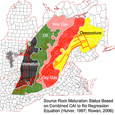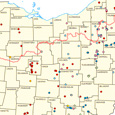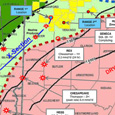Judge: Propane and butane are petroleum
Wednesday, April 13, 2016

CADIZ, Ohio — Landowners are turning their attention to a case in Harrison County after a judge ruled in favor of the Sunoco Pipeline L.P. in February.
Judge T. Shawn Hervey made the ruling in Sunoco Pipeline L.P. vs Carol A. Teter, trustee of the Carol A. Teter Revocable Living Trust, et al.
The ruling
In his decision, Hervey ruled that liquefied propane and butane are considered petroleum. This means that under Ohio Revised Code, the pipeline can use eminent domain to gain permanent and temporary easements across the Teter farm in order to put the pipeline through the land.
The lawsuit was filed in May 2015 by Sunoco against Teter.
Pipeline plans
Sunoco is building the Mariner East 2 Pipeline. It will run from Scio, Ohio, to Marcus Hook, Pennsylvania, and will carry only pure (99 percent+) liquefied propane and butane. At least four Pennsylvania junctions would contain “off ramps” where Sunoco could off load propane to Pennsylvanians. Sunoco plans no such Ohio “off ramps.”
The Teter family purchased the 162-acre farm in 2001 with the existing Enterprise Pipeline on the property. Then in 2010, the APEX pipeline was built along the existing pipeline. Both are on the south end of the property.
The line for the Sunoco Pipeline would go through the northern portion of the farm. The Teters are the last landowner in the line of the Sunoco Pipeline in Harrison County that does not have an easement for the Sunoco Pipeline.
Common carrier
According to court documents, the landowner contends that Sunoco is not a “common carrier,” the pipeline does not serve a public purpose, and pure liquefied propane and butane are not “petroleum” under the Ohio Revised Code.
Teter alleged that several facts supporting Sunoco’s argument that the pipeline is a common carrier and has a public purpose are not true.
Teter argues that if the plants were built in Ohio, and not in Pennsylvania, then Ohioans could reap the benefits of Ohio’s natural resources.
No Ohio benefits
Second, plans for the pipeline show no “off ramps” in Ohio. The landowner argued that, other than a few landowners with oil and gas leases, Ohioans would not benefit.
The final argument is that one of the pipeline’s committed shippers claims it will ship most of its propane and butane overseas.
Pipeline is necessary
Judge Hervey ruled in favor of Sunoco and found that pure liquefied propane and butane meet Ohio’s statutory definition of “petroleum” in the Ohio Revised Code.
He also said the pipeline is a common carrier and that it is necessary to transport propane and butane. He added that the pipeline services a public use providing consumers access to Ohio products.
Appeal filed
Although the landowners did not win at the county court level, they are appealing it to the Seventh District Court of Appeals.
Nicholas Andersen, who is representing the Teter family, said his clients will take the case to the Ohio Supreme Court if needed.
The Teter family has filed a brief in the appeals court and Sunoco has until May 2 to file its brief. Then a date for oral arguments in the appeals court will be set either in June or July.
“For now, we are playing the waiting game,” said Andersen.
No pipeline
He said his clients have no desire to give up the fight, they simply do not want another pipeline on their farm.
“Sunoco feels like they can just take your land,” said Andersen.
Sunoco, represented by Attorney Gregory D. Brunton of the Cleveland-based law firm of Reminger Co., LPA, did not have any comments due to this being a pending case.




